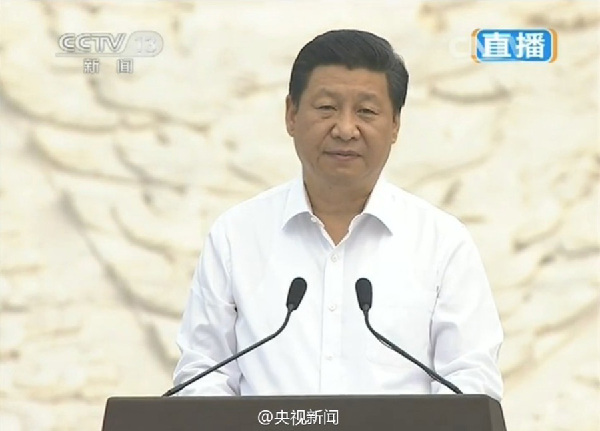 |
|
President Xi Jinping delivers a speech at a memorial ceremony marking the 77th anniversary of the start of the War of Resistance Against Japanese Aggression, which lasted from 1937 until 1945, outside the Museum of the War of Chinese People's Resistance Against Japanese Aggression in Fengtai district, Beijing on Monday. [Photo/CCTV's official Sina Weibo account] |
"History is history and facts are facts. Nobody can change history and facts. Anyone who intends to deny, distort or beautify history will not find agreement among Chinese people and people of all other countries," Xi said, referring to concern that Japan is trying to distort the history of the war.
The ceremony was held at the Museum of the War of the Chinese People's Resistance Against Japanese Aggression in Beijing.
"It's a pity that a small minority of people still ignore the iron-clad history and the fact that tens of millions of innocent people sacrificed their lives in the war nearly 70 years after the victory of the Chinese people's war of resistance against Japanese aggression and the world anti- fascist war," he said.
This minority has repeatedly denied or even beautified the history of invasion, undermining mutual trust among states and creating regional tensions. Such behavior has been strongly condemned by the world's peace-loving people, said Xi.
"History is the best textbook, as well as the best dose of sobriety," Xi said, adding that Chinese people who remember the torment of war have always been in pursuit of peace.
"History tells us that any aggression by force is doomed to fail," Xi warned. "China will unswervingly pursue the road of peaceful development and hope all other countries in the world can take the same road."
Xi's remarks came after Japan's reinterpretation of its pacifist Constitution last week.
Japanese Prime Minister Shinzo Abe's cabinet endorsed a reinterpretation of its pacifist Constitution on July 1 for the right to collective self-defense, fueling concerns over Japan's return to its past militarism.
Previously, right-wingers in Japan initiated a series of provocations, from the "nationalization" of China's Diaoyu Islands by the former Japanese government to Abe's ridiculous visit to the Yasukuni Shrine.
Japan invaded northeast China in September 1931. But historians agree that Japan's full-scale invasion started on July 7, 1937, when a crucial access point to Beijing, Lugou Bridge, was attacked by Japanese troops.
Around 35 million Chinese soldiers and civilians were killed or injured by Japanese troops during the war against Japanese aggression (1937-45), with at least 300,000 people slaughtered in the Nanjing Massacre alone.
Xi said the Chinese nation at that time faced the most direct threats, prompting "all ethnic groups, classes, parties, social organizations and patriots from all circles, as well as Hong Kong, Macao and Taiwan compatriots and overseas Chinese, to unite and throw themselves into a grand struggle which meant life and death for the Chinese nation."
He added that the Communist Party of China had also shouldered its historical responsibilities by calling for a national united front against Japanese invasion.
Calling the Chinese people's resistance against aggression by the Japanese a "heroic ode" in which Chinese patriots "bathed in blood," Xi said Monday's gathering should serve to recall history, commemorate martyrs, cherish peace and sound a warning for the future.
The Chinese president also unveiled a sculpture commemorating the start of China's War of Resistance Against Japanese Aggression in the company of two veteran Chinese soldiers, one from the Communist Party of China and another from the Kuomintang, who took part in the war, as well as with Chinese teenagers.
The sculpture is based on a military medal specially designed for veteran soldiers who fought in the war from 1937 to 1945.
"The inauguration of this sculpture commemorates those who devoted their lives to fighting for national independence and freedom as well as those who made great contributions to peace and justice, and to console the victims of the war," Xi said.
